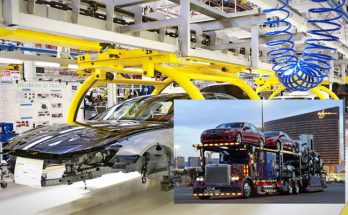Nafta automotive industry mexicoOn September 30, 2018, a month following the U.S. and Mexico moved toward replacing the North American Cost-free Trade Agreement (NAFTA), Canada joined to make a new continental trade agreement. The market in basic is not content. The Trump administration’s objective with the proposed modifications is to bring back manufacturing to the US and job creation. But ultimately, if the NAFTA guidelines are too demanding or content targets are also steep, it could have an adverse effect,” Bill Rinna, director of car forecasts for the Americas at LMC Automotive, told AMS.
ARNOLD: Dziczek says the deal with Mexico boosts the portion of a auto that has to be constructed in North America up from 62 % to 75 percent. But several cars, she says, already comply with that, and for these that never, automakers could use far more North American parts or just pay a reasonably little penalty. But Dziczek says a significantly bigger issue looming out there is that the U.S. still could impose steep tariffs that it’s been taking into consideration for cars and auto components from the rest of the world, outside of NAFTA.
Automotive Market Associations Seek Negotiationsnafta automotive industry canada
nafta automotive marketAutomotive associations seek a North American agreement. Mexican light automobile production rose from 1.1 million in 1994 at the commence of NAFTA to 2.9 million in 2014 and three.eight million final year. Plants have also grown to giant size, for example Volkswagen in Puebla (461,248 last year, according to Automotive News information), Nissan Aguascalientes 1 and 2 (560,361 combined) GM’s San Luis Potosi (307,719) and Silao (410,867), and FCA’s Saltillo (342,653).
Unlike the Trump trade group, the negotiating teams from Canada and Mexico have place forth affordable proposals that would build on the accomplishment of NAFTA. In the most lately concluded round, Canada proposed that content guidelines be expanded to incorporate expenditures for engineering, research and development and other high-worth-added solutions that are vital to creating cars but are not counted in the present rules on North American content. Mexico welcomed the proposal as “revolutionary” USTR Lighthizer rejected it out of hand.
Some industry watchers such as Gabriella Siller, director of Financial and Economic Evaluation at Banco BASE, think that a adjust in the rules of origin, or a achievable exit of the United States from the NAFTA, will have a substantial influence on all three of the countries’ automotive industries. Improved taxes on vehicle imports and auto components from the automotive sector in Mexico to the United States and Canada will precipitate a realignment and feasible disruption of the NAFTA region supply chains. Improved taxes on imports of Mexican item into the US will result in larger finish rates to the customer.
Auto Industry’s High Stakes In Ongoing NAFTA TalksNafta Automotive Industry
Auto Industry Relieved By NAFTA 2.0, But Results May BeOn September 30, 2018, a month following the U.S. and Mexico moved toward replacing the North American Cost-free Trade Agreement (NAFTA), Canada joined to generate a new continental trade agreement. In 2017, nevertheless, the light car market in the NAFTA area declined by 1.four%, with only Canada reporting an increase. The US market – the region’s largest – appears most likely to decline in 2018 and 2019. As a complete, the Automotive Worldforecast expects the region’s light automobile sales to return to development right after 2019, with a potential new peak at the finish of the forecast period.
A single option would be to ignore the NAFTA guidelines altogether and merely import automobiles beneath the US’s most favoured nation (MFN) tariffs, operating at 2.5%. A move that would push up rates. Several parts for instance are currently imported into the US at MFN prices – 16% all components from Canada and 23% from Mexico are traded this way.
It really is NAFTA neighbours are the collectively the largest customer of US-produced autos, taking much more than 71% of US vehicle exports in 2017. Canada took by far the biggest share at 912,277 in 2017, representing nearly half. Mexico, by contrast, was the US’s fourth largest export marketplace with 159,767 automobiles, putting it behind Germany. There is no doubt the US has a trade imbalance with Mexico given the numbers it sends north.
How Trump’s NAFTA Deal Will Influence Automakersnafta impact on us automotive industry
Auto Industry Relieved By NAFTA 2.0, But Results May BeOn September 30, 2018, a month after the U.S. and Mexico moved toward replacing the North American Free Trade Agreement (NAFTA), Canada joined to create a new continental trade agreement. Mexico elected a new president early July, which has difficult the problem even additional – the left-leaning Andres Manuel Lopez Obrador (or Amlo, as he’s known). What Will Amlo Do? is now the massive query. A past critic of NAFTA, Amlo softened his stance on the campaign trail. In an interview with news agency Reuters for the duration of July, Jesus Seade, Lopez Obrador’s chief negotiator for the NAFTA, stated an agreement could be reached by December.
The current 62.5-% requirement is comparatively strict already by international standards. It was the result of a compromise when NAFTA was getting negotiated in the early 1990s. The U.S. auto sector—back then basically Ford, GM, and Chrysler—demanded a minimum content requirement of 60 %. Canada wanted no greater than 60 percent and Mexico wanted 65, so the 3 parties split the distinction.
Probably no business has a lot more deeply embraced the advantages of the North American Cost-free Trade Agreement since it went into impact on Jan. 1, 1994. That aids clarify why automakers and auto components suppliers have become some of the fiercest and most vocal opponents of the Trump administration’s program to renegotiate, and even demolish, NAFTA.





